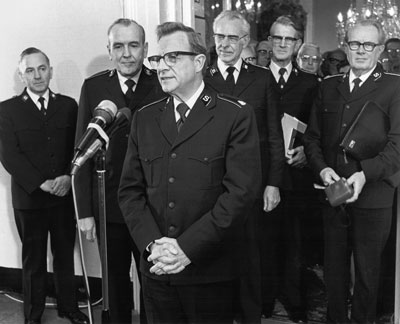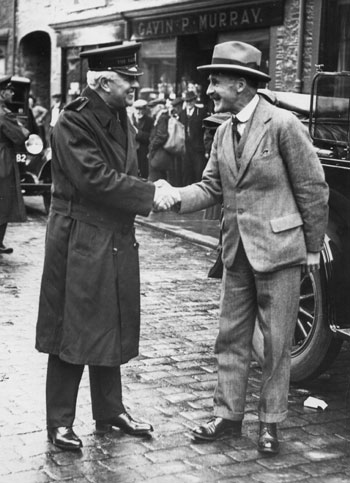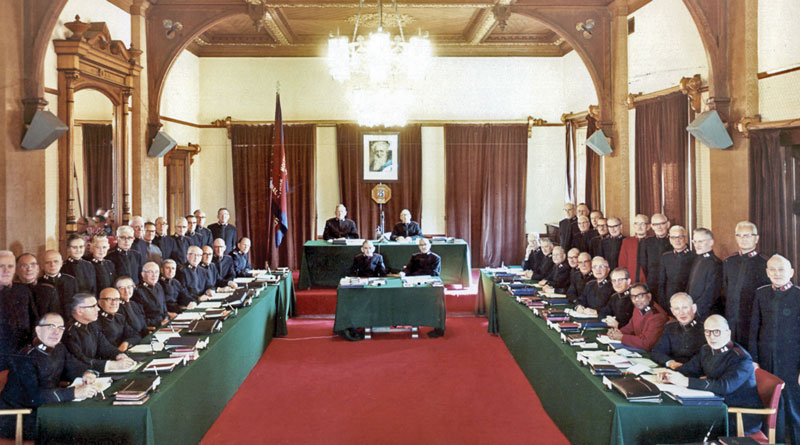On May 17, the High Council will convene in London, England, at the Renaissance London Heathrow Hotel to elect the 21st international leader of The Salvation Army. I invite you to take a sneak peek past the closed door of the High Council chamber.
The 2018 High Council will have a total of 111 members, including 77 commissioners and 34 colonels. The gender balance is similar to the past two High Councils, with 52 men and 59 women. The current qualifying appointments for High Council membership are the Chief of the Staff, all active commissioners (with the exception of the spouse of the General), all territorial commanders and all territorial presidents of women’s ministries.
 General Arnold Brown following his election as the Army’s 11th international leader
General Arnold Brown following his election as the Army’s 11th international leader
Prior to the official opening of the High Council, General André Cox, the Army’s current international leader, and Commissioner Silvia Cox, World President of Women’s Ministries, will lead a pre-Council gathering at the Renaissance Hotel on May 15-16. When this meeting has concluded, neither the General nor Commissioner Cox will have communication with members of the High Council except when he is alerted as voting commences and then privately informed of the General-elect’s identity.
Following confirmation by a legal advisor (not a member of the High Council) that the Council has been lawfully assembled with only eligible membership present, the Chief of the Staff will oversee the election of a president by means of a voting procedure that will continue for subsequent elections for vice-president, chaplain and seven members of a questions committee. Four tellers will also be identified. After the president has been elected, the Chief of the Staff becomes a peer with the membership, and the president assumes leadership of the High Council.
 The first High Council was convened in 1929
The first High Council was convened in 1929
The central work of the High Council commences when the president announces that nominations for General will begin. Each step in the nomination and election process steadily proceeds unrushed. Those who are nominated and agree to stand for election become candidates for the office of General.
All other members of the High Council meet to debate and approve a list of questions for the candidates that have been fashioned by the questions committee. The group then adjourns for at least one full day in order to give candidates time to prepare responses to the questions that are then shared in printed form with all members.
Once a candidate submits replies to the questions, the answers cannot be altered before or during the reading by the candidate to the High Council. The spouse of each married candidate is also given a lesser number of questions to answer. Following each presentation by the candidate and spouse, the floor is opened for clarification and follow-up questions.
 General Edward Higgins on motortour in Scotland
General Edward Higgins on motortour in Scotland
The voting now begins. The candidate receiving the least votes after each ballot automatically drops from contention. All candidates have the option of withdrawing before the next ballot begins. A General is elected when he or she receives a two-thirds majority of the votes in the first through third ballots. If a fourth ballot is required, the General is elected by a simple majority of the members present.
At the close of the 19th High Council in late May or early June, Salvationists around the world will rejoice when the newly elected General is announced by the president of the High Council. Following the time of jubilation, may we join in united, fervent prayer for the Lord’s anointed to lead and empower The Salvation Army to fulfil its God-ordained mission “to preach the gospel of Jesus Christ and to meet human needs in his name without discrimination.”
Visit this page for updates about the 2018 High Council.
For an in-depth understanding of the history and functioning of the High Council, see 1929: A Crisis That Shaped The Salvation Army’s Future and Inside a High Council, both by General John Larsson (Rtd).
Commissioner William W. Francis, territorial commander in the Canada and Bermuda Territory from 2007 to 2011, was a member of two High Councils (2006 and 2011), and served as president of the High Council in 2011 before being nominated as a candidate for General. He leads an active retirement in Florida with his wife, Commissioner Marilyn D. Francis.










Comment
On Tuesday, May 22, 2018, Captain Ron Bussell (Church Army) said:
Leave a Comment